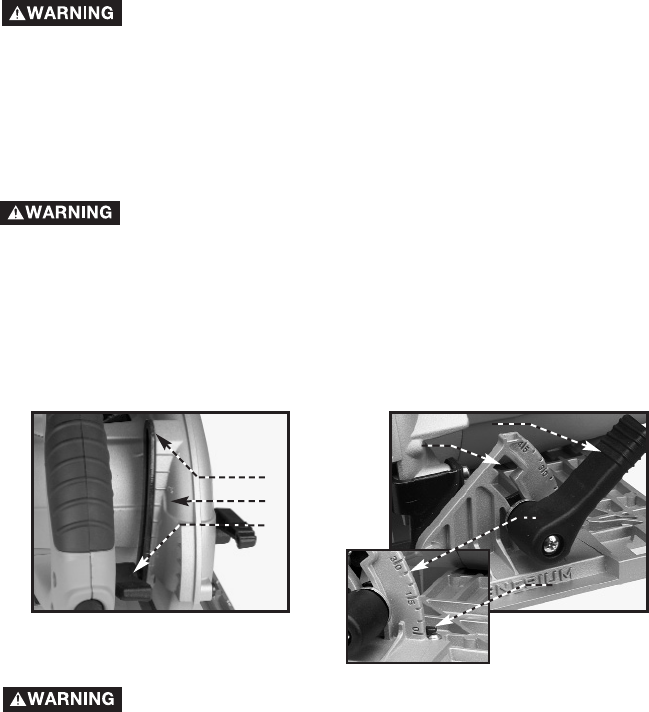
9
The telescoping guard (A) Fig. 3 is a safety device important to your
protection. Every time you use the saw, verify that the telescoping guard
rotates freely and returns quickly and completely to its closed position. At
least once a month, remove any accumulated debris (sawdust, pitch, etc.)
from the area around the hub (B) of the telescoping guard. DO NOT
LUBRICATE THIS AREA. The hub has a dry film lubricated surface that
does not need oiling. DO NOT block or wedge the telescoping guard in the
open position.
DO NOT use your saw if the telescoping guard is not in
working order. If telescoping guard movement is sluggish or
binding exists, return the saw to your nearest AUTHORIZED
PORTER-CABLE SERVICE STATION or PORTER-CABLE
SERVICE CENTER for repair.
TO ADJUST DEPTH OF CUT FOR NORMAL CUTTING
Adjust the depth of cut so that the saw blade barely protrudes through the
thickness of the workpiece. To adjust:
1. Lift the depth adjustment locking lever (A) Fig. 6, located at the rear of
the saw.
2. Raise or lower the saw housing to the correct level.
NOTE: The upper guard (B) Fig. 6 is marked in 1/4" increments for
convenience in setting the depth of cut. Align the depth segment mark
(C) Fig. 6 with the desired depth marking on the guard.
3. Press the depth-adjusting locking lever down firmly to lock the saw in
the selected position.
TO ADJUST FOR BEVEL CUTS
1. Loosen the bevel adjusting lever (A) Fig. 7.
2. Tilt the saw base until the desired graduation line on the bevel segment
(B) Fig. 7 aligns with the indicator (C) Fig. 7 on the bracket.
3. Tighten the bevel adjusting lever firmly.
4. For bevel cuts greater than 45°, set the guide on the 45° mark. Lift the
bevel adjusting lever into the slot (D) Fig. 7 and move the saw base to
the greater angle. Tighten the bevel adjusting lever firmly.
DISCONNECT TOOL FROM POWER SOURCE.
TELESCOPING GUARD
Fig. 6
Fig.7
A
B
A
B
C
DISCONNECT TOOL FROM POWER SOURCE.
D
C

















